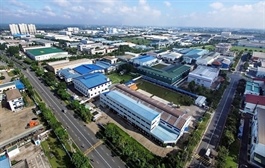ADB projects Việt Nam’s 2024 GDP growth at 6 per cent
ADB projects Việt Nam’s 2024 GDP growth at 6 per cent
The Asian Development Bank (ADB) has forecast Việt Nam's Gross Domestic Product (GDP) growth at 6 per cent for 2024, according to the Asian Development Outlook (ADO).

People shop at a supermarket. The bank lowered its growth forecast for Việt Nam this year to 5.2 per cent from the previous 5.8 per cent forecast. — Photo vneconomy.vn |
The bank also lowered its growth forecast for Việt Nam this year to 5.2 per cent from the previous 5.8 per cent forecast.
ADB experts pointed out that the weaker-than-expected recovery of external demand continued to impede industry and services output, thereby dragging the recovery of jobs and domestic consumption.
The prudent and proactive monetary policy, supported by effective price controls of gasoline, electricity, food, healthcare, and education, all contributed to containing inflation.
In line with this, the country’s inflation is projected to remain at 3.8 per cent for this year before rising to 4 per cent in 2024.
Think-tanks analysed that risks to the outlook include persistently elevated interest rates in the US and other advanced economies, a factor which could contribute to financial instability occurring in vulnerable economies around the region, especially those with high debt.
Furthermore, potential supply disruptions caused by the El Niño weather pattern or the Russia-Ukraine conflict could also rekindle inflation, particularly with regard to food and energy.
Meanwhile, the ADB raised its economic forecast for developing economies in Asia and the Pacific, following robust domestic demand which has been driven by higher-than-expected growth in China and India.
The regional economy is therefore expected to grow by 4.9 per cent this year, compared with a previous forecast of 4.7 per cent in September.
Albert Park, ADB chief economist, said that developing Asia continues to grow at a robust pace, despite facing a challenging global environment, adding that inflation in the region is also gradually coming under control.
However, he pointed out several risks, including elevated global interest rates and climate events such as El Niño, and advised governments in Asia and the Pacific to stay vigilant in order to ensure that their economies are resilient and that growth is sustainable.
According to figures given by economists, the growth outlook for Southeast Asia this year was lowered to 4.3 per cent from 4.6 per cent amid weak demand for manufacturing exports.



























